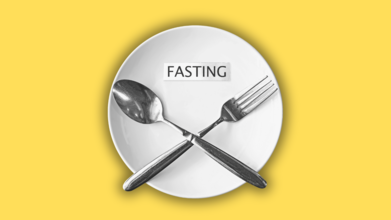- Health Conditions A-Z
- Health & Wellness
- Nutrition
- Fitness
- Health News
- Ayurveda
- Videos
- Medicine A-Z
- Parenting
- Web Stories
Two Everyday Habits That Are Severely Damaging Your Heart, Say New AHA Guidelines

Credits: Freepik
Nearly half of American adults live with high blood pressure. That staggering figure, paired with its direct link to heart disease, stroke, kidney damage, and even dementia, underscores why the American Heart Association (AHA) and the American College of Cardiology (ACC) have issued updated guidelines for 2025.
The recommendations focus on two everyday habits most people overlook: cutting back on sodium and rethinking alcohol. While these steps may sound simple, their impact on long-term heart health is profound.
Blood pressure measures the force of blood pushing against the walls of your arteries. When that pressure is consistently too high, it damages the vessels, strains the heart, and increases the risk of deadly complications.
According to the Centers for Disease Control and Prevention, hypertension affects about 46.7% of adults in the United States. Many people don’t even realize they have it, because symptoms often remain silent until serious damage occurs.
The new AHA/ACC guidelines emphasize prevention and early intervention. Instead of waiting until blood pressure reaches stage 2 hypertension (140/90 mm Hg or higher), clinicians are now urged to act when readings fall in the stage 1 range (130–139/80–89 mm Hg). This shift means lifestyle changes—and in some cases, treatment—will be recommended earlier.
Dr. Daniel Jones, chair of the guideline-writing committee, explained the reasoning in a release, “By addressing individual risks earlier and offering more tailored strategies across the lifespan, the 2025 guideline aims to help more people manage blood pressure and reduce the toll of heart disease, kidney disease, Type 2 diabetes and dementia.”
Salt
For decades, sodium has been a known culprit in raising blood pressure, yet Americans continue to consume far more than recommended. On average, adults eat about 3,400 milligrams per day—roughly 1.5 teaspoons of salt—when national guidelines suggest no more than 2,300 mg, with an ideal target of 1,500 mg.
Most of this sodium doesn’t come from the salt shaker. Instead, it’s hidden in packaged, processed, and restaurant foods—bread, cold cuts, pizza, cheese, canned soups, and fast food meals. In fact, the Food and Drug Administration estimates that over 70% of daily sodium intake in the U.S. comes from prepared foods. Lowering sodium is one of the most effective ways to reduce hypertension risk. The new guidelines urge people to:
- Check food labels carefully.
- Opt for low-sodium or no-salt-added versions.
- Prepare meals at home to control salt levels.
- Wash canned vegetables and beans to reduce sodium content.
- Use potassium-enriched salt substitutes, which have been shown to lower blood pressure.
This isn’t just about numbers. Even modest reductions in sodium intake—say, cutting 1,000 mg per day—can significantly lower blood pressure and decrease the risk of heart attack and stroke.
Alcohol
The second habit under scrutiny is alcohol. While a glass of wine has often been portrayed as “heart healthy,” the latest data is clear: the safest level of alcohol consumption for blood pressure is none.
Studies show that both systolic and diastolic blood pressure rise steadily with alcohol intake. People who abstain altogether have the lowest hypertension risk, while those who reduce consumption by at least half see meaningful improvements in blood pressure. The AHA and ACC recommend strict limits:
- Men should consume no more than two drinks per day.
- Women should have no more than one drink per day.
Even within those boundaries, experts stress moderation. Excess alcohol isn’t just tied to hypertension—it’s linked to higher rates of cancer, liver disease, and heart failure. In the last two decades, deaths from alcohol-related cancers and liver disease have surged.
The new guidelines send a blunt message: if you choose to drink, keep it minimal; if you can, don’t drink at all.
Why Lifestyle Still Matters For Your Heart?
While sodium and alcohol are the headline changes, the broader guidance still emphasizes a holistic approach to cardiovascular health.
The DASH diet, short for Dietary Approaches to Stop Hypertension—remains a cornerstone. It encourages vegetables, fruits, whole grains, legumes, nuts, low-fat dairy, lean proteins, and healthy oils while limiting processed foods and sugary drinks.
Exercise is equally critical. The guidelines recommend 75 to 150 minutes per week of physical activity, from brisk walking to strength training. Consistent exercise not only lowers blood pressure but also improves weight management, insulin sensitivity, and stress reduction.
Stress, sleep, and environmental factors also play a role. Poor sleep, high stress levels, air pollution, and even exposure to heavy metals can all influence blood pressure. Managing these risks requires a broader lifestyle focus beyond just diet and alcohol.
AHA Guidelines Focus On Early Action And Prevetion
Heart disease remains the leading cause of death in the U.S. and worldwide. The tragedy is that many cases are preventable. By addressing hypertension earlier, the updated guidelines aim to reduce the number of people who progress from manageable high blood pressure to life-threatening cardiovascular events.
Stage 1 hypertension doesn’t always require medication, but it does call for lifestyle changes—and those changes, research shows, can be remarkably effective. Reducing salt, limiting alcohol, exercising regularly, and adopting a heart-healthy diet can delay or even prevent the need for long-term drug therapy.
Diet Or Exercise? Study Finds What Plays A Bigger Role In Weight Loss

(Credit - Canva)
Many people who start working out often think that as long as they are exercising, they can eat whatever they want. However, on the flip side, many people believe that controlling one’s diet is more important. So, which one is true? What does more weight do in your fitness journey?
A recent study published in the Proceedings of the National Academy of Sciences supports this idea, finding that diet, not a lack of physical activity, is the main reason for the obesity epidemic. This doesn't mean exercise isn't important—it absolutely is—but if your main goal is weight loss, the study suggests that what you eat matters more than how much you work out.
Obesity on the other hand is another factor that prompts more research like this. In recent years we have seen obesity rates increase, current stats showing that one out of eight people are obese (World Health Organization). The statistics show that adult obesity rates have quadrupled since 1990. Is diet the cause of this?
Diet vs. Exercise: Which Matters More for Weight?
To understand whether consuming too many calories or not burning enough calories is the primary cause of obesity, a team of researchers compared data from over 4,000 people across six continents. The groups included highly active people like farmers and hunter-gatherers, as well as people from industrialized countries who were much less active.
The study found that people in industrialized nations had higher body weight and body fat. However, after adjusting for body size, the researchers found that they were only burning a little bit fewer calories each day than the more active groups. This was a surprising discovery, considering their lifestyles were far less active. This suggests that the rise in obesity isn't due to people failing to burn enough calories, but rather because they are simply eating too many calories.
Does A Diet-First Approach Work For Weight Loss?
While this study is observational and can't prove a direct cause-and-effect relationship, other experts agree with its findings. According to one expert, decades of research have shown that physical activity makes only a "minor contribution" to weight management.
A few studies have suggested the opposite, and some researchers argue that a combination of diet and exercise is best for long-term weight loss. However, most of the evidence supports focusing on diet first. One likely reason is that our bodies naturally adapt to exercise. When you become very active, your body becomes more efficient, so you don't keep burning more and more calories over time.
Does Exercise Not Matter For Weight Loss?
This research does not mean you should stop exercising. In fact, experts call exercise "the most powerful life-extending intervention we have," with clear benefits for both physical and mental health.
However, when it comes to weight, the message is clear: focus on the number of calories you're eating, not just the number you're burning. Experts recommend a diet rich in fresh fruits, vegetables, whole grains, and lean proteins while cutting back on processed foods.
The study also points out that the responsibility for these changes isn't just on individuals. It's often easier and cheaper to buy junk food than healthy food. Governments and public health officials have a role to play in making healthy, fresh foods more accessible and affordable for everyone.
Watch: What Really Happens To Your Body After 72 Hours Without Food?

Credits: Canva
There's a new "miracle" diet every few months that swears to yield rapid results- cut carbs, miss meals, juice for days only. You've probably either given one a try yourself or seen someone close to you dive in headfirst. Do these extreme diets really benefit your body, or do they simply put your body into survival mode? From YouTube "self-experiments" to TikTok challenges, prolonged fasting has become one of the most contentious health trends of the decade. Its proponents argue that it improves cognitive function, activates robust repair processes, and even reverses aging. Critics counter that it approaches irresponsible, forcing the body into starvation mode with surprisingly little scientific evidence to support many of the more lofty assertions.
So, what actually goes down when you go without food for three days? To find out, we must dissect how the body slowly changes gears hour by hour, what research really reveals, and why fasting for 72 hours is much more complicated than a speedy "detox hack."
The First 6–10 Hours
In the first few hours after a meal, your body relies on glucose from digested food to power everything from your brain to your muscles. By the 6-to-10-hour mark, those reserves are nearly gone.
This is when the pancreas steps in, secreting glucagon—a hormone that is meant to maintain blood sugar levels by drawing on stored glycogen in your liver. What happens? You might get lightheaded, cranky, or suddenly sensitive to hunger. For most folks, this stage is like missing a meal or two, but it's merely the start of the metabolic cascade.
Repair Mode and Autophagy After 16–24 Hours
Past 16 hours, the body begins to turn on itself for energy. Autophagy starts—cells actually break down and reuse damaged parts for fuel.
Certain animal experiments propose this might sweep away toxic proteins and cut disease risk. A few aggressive assertions even attribute autophagy to suppressing cancer cells, but authorities warn that is a long way from being established in humans. The one thing that is certain, though, is that growth hormone release surges at this point, slowing muscle loss and keeping you going even as calories run out.
At 24 hours, glucose stores are depleted mainly. Fat is now your energy supply, with ketones beginning to accumulate in the blood. For the fasting aficionados, this is the "deep repair" stage, although it comes with headaches, exhaustion, and hunger pangs for most beginners.
Ketosis After 48 Hours
By the 48-hour point, your body is solidly in ketosis, living off fat-based ketones as its fuel money. For some, this change introduces unexpected acuity. Small studies indicate that ketones can temporarily enhance concentration and cognitive functions—an evolutionary response to enable humans to search for food when there was none to be found.
But the disadvantages are difficult to overlook. Energy lulls, dehydration, confusion, and crankiness are typical. Muscle protein is progressively metabolized for necessary amino acids. Hunger peaks at this point, pushing mental determination and physical endurance to the limit.
Survival Mode After 72 Hours
Three consecutive days without food marks the turning point. At this stage, fasting isn't any longer a matter of "burning fat" or "detoxing"—it's survival.
A 2019 Queen Mary University of London study indicated that long periods of fasting have the potential to induce a multi-organ reprogramming, resetting the immune system and metabolism. This involves increased autophagy, ongoing dependence on fat reserves, and immune cell production changes.
Not all have an equal "reset." For some, the cost is dire: fatigue, lightheadedness, electrolyte disturbances, and risk of heart strain. Unscheduled by doctors, danger soon surpasses possible gain.
Is 72-Hour Fasting Safe?
As Johns Hopkins Medicine says, prolonged fasting can have an unwanted effect if the body enters starvation mode, where it holds on to fat instead of burning it. Rather than aiding weight control, this can decelerate metabolism and make it more difficult to sustain weight loss over time.
Side effects are also true. According to Healthline, symptoms include nausea and irritability all the way to severe fatigue and brain fog while in ketosis. For patients with diabetes, heart disease, or deficiencies, the dangers can be life-threatening.
Should You Still Try It?
If fasting for 72 hours is so strenuous, then why do people still try it? Partly, it's the appeal of control—the notion of "restarting" the body and breaking with contemporary reliance on continuous snacking. There's also new science suggesting intermittent fasting, when done safely, might promote longevity and metabolic health but specialists caution there's a huge difference between intermittent fasting (such as 5:2 or 16:8 eating styles) and long-term starvation. The former can be safe and sustainable; the latter belongs in clinical trials or doctor's offices.
Three days of fasting demonstrates just how adaptive the human body is. From tapping fat reserves to recycling junk cells, fasting biology is both interesting and intricate. But being interesting does not equate to being endorsed.
For most people, safer fasting regimens—such as shorter intermittent fasts—are more researched and easier to stick to. Anyone thinking about extreme fasting should first see a healthcare professional. For one individual, it might seem like a "reset," but it might cause severe complications for another.
What the 72-hour fast actually shows us is not so much about losing weight as it is about the precarious tightrope our bodies walk to sustain us. It's a message that health isn't about extremes, it's about sustainability, support, and regard for the limitations of human physiology.
Disclaimer: The content of this article is for informational purposes only. Always consult a qualified healthcare professional before undertaking extensive dietary changes.
Why a Top Gut Doctor Says Bacon Should Be Banned from Breakfast Plates

Credits: Canva
If you think the worst thing on your breakfast plate is sugar in your cereal or the butter on your toast, think harder. According to Dr Alan Desmond, gut health specialist and author, the worst thing is processed food and he wishes the world could wave goodbye to it forever. Referring to bacon, the crispy, salty, beloved slice that makes brunch plates look complete, he says that it may also be shortening lives by the hundreds of thousands.
Why Bacon Is the Bad for Health
Dr Desmond does not mince words when it comes to processed meats. Bacon, sausages, salami, pepperoni, ham, hot dogs and other smoky foods may taste divine, but their health record is worse than you might imagine. These meats are not just linked to bowel cancer, a risk factor many already know, but also to heart disease, type 2 diabetes and premature death. In fact, global health experts estimate that processed meats contribute to over 644,000 preventable deaths each year. To put it simply, that tasty strip in your pan may be costing society more than just a few clogged arteries.
Why Doctors Never Say “Pass the Bacon”
Unlike most people, Dr Desmond admits he has never felt tempted to have bacon at breakfast. The science, in his view, is clear that regular consumption of processed meats is dangerous, and avoiding them entirely is one of the simplest dietary decisions you can make to protect your health. In an age where everyone is chasing superfoods and longevity hacks, giving up bacon might sound boring, but it could be one of the most effective moves for your long-term wellbeing.
Also Read: 101-Year-Old Harvard Doctor's Secrets To Live A Longer, Healthier Life
Ultra-Processed Foods and Cancer Risk
Ice cream, breakfast cereal, and that quick-fix instant noodle packet might save a lot of your time and satisfy your taste buds. But a growing body of research suggests they may be doing more harm than just expanding your waistline. A new study has drawn a strong link between eating ultra-processed foods (UPFs) and a significantly higher risk of developing lung cancer.
Here is what you need to know about the findings and whether your daily diet might be putting your lungs at risk.
The study, led by Chinese researchers and published in the medical journal Thorax, tracked the health and food habits of over 100,000 American adults, with an average age of 63, for around 12 years. Using detailed dietary questionnaires, researchers zoomed in on the intake of UPFs, which include all your guilty pleasures: cakes, cookies, soft drinks, frozen pizzas, hot dogs, margarine, sugary cereals, and yes, even your beloved salty snacks.
Participants consumed anywhere between half a serving to six servings of these foods daily, with the average landing at nearly three servings a day. Lunch meats and soft drinks came out on top as the most commonly consumed items.
Also Read: This Surprisingly Simple Sleep Reset Works Better Than Any Hack
By the end of the study, 1,706 participants had developed lung cancer. When researchers compared diets, a disturbing pattern emerged: those who ate the most UPFs had a 41 per cent greater chance of developing lung cancer compared to those who ate the least.
It is Not Just About Smoking
Naturally, the study controlled for smoking status, an obvious and major risk factor for lung cancer. But the researchers admit they could not account for smoking intensity, a variable that could skew results. Still, the pattern remained strong even when separating out different lung cancer types, including both small cell and non-small cell variants.
Reports say that a quarter of lung cancer cases occur in non-smokers, and this highlights the need to explore other possible triggers, including diet.
However, the study is not airtight. Dietary habits change a lot over 12 years, and participants only logged their UPF intake at the start.
What is the Study Actually Saying?
The study’s authors are not claiming that UPFs cause lung cancer. But the association is strong enough to spark concern. They say global efforts to cut back on ultra-processed foods could be an effective way to reduce lung cancer cases, especially among non-smokers.
They are not wrong. While the direct line between a cupcake and a cancer cell has not been proven, UPFs are already known to contribute to obesity, heart disease, type 2 diabetes, and even depression. Adding lung cancer to the list, even with some scientific caveats, raises the stakes for rethinking what is on your plate.
Vaping May Be Rising, But Smoking Is Falling
On a related note, separate research from the University of Michigan offers a silver lining: teenage smoking is on the decline. Tracking data on 16- and 17-year-olds in Britain from 1974, 1986, and 2018, the study showed a drop from 33 per cent to 12 per cent in teen smoking. But in 2018, 11 per cent of teens reported using e-cigarettes instead.
That is still a win in the long-term fight against lung cancer, but it also makes lifestyle-related risks like diet more significant. If fewer people are smoking, then other contributors to lung cancer, like poor nutrition, could become even more important to understand.
Should You Panic or Not?
The science is not settled, and researchers are being cautious. Still, the message is clear: even if you have never lit a cigarette in your life, what you eat might be silently setting off alarms in your body.
While more studies are needed to confirm causation, this new research adds to a growing chorus warning us about the dangers of overly processed meals. You do not need to quit cake completely, but maybe it is time to take care of your lungs more by making better food choices.
© 2024 Bennett, Coleman & Company Limited

